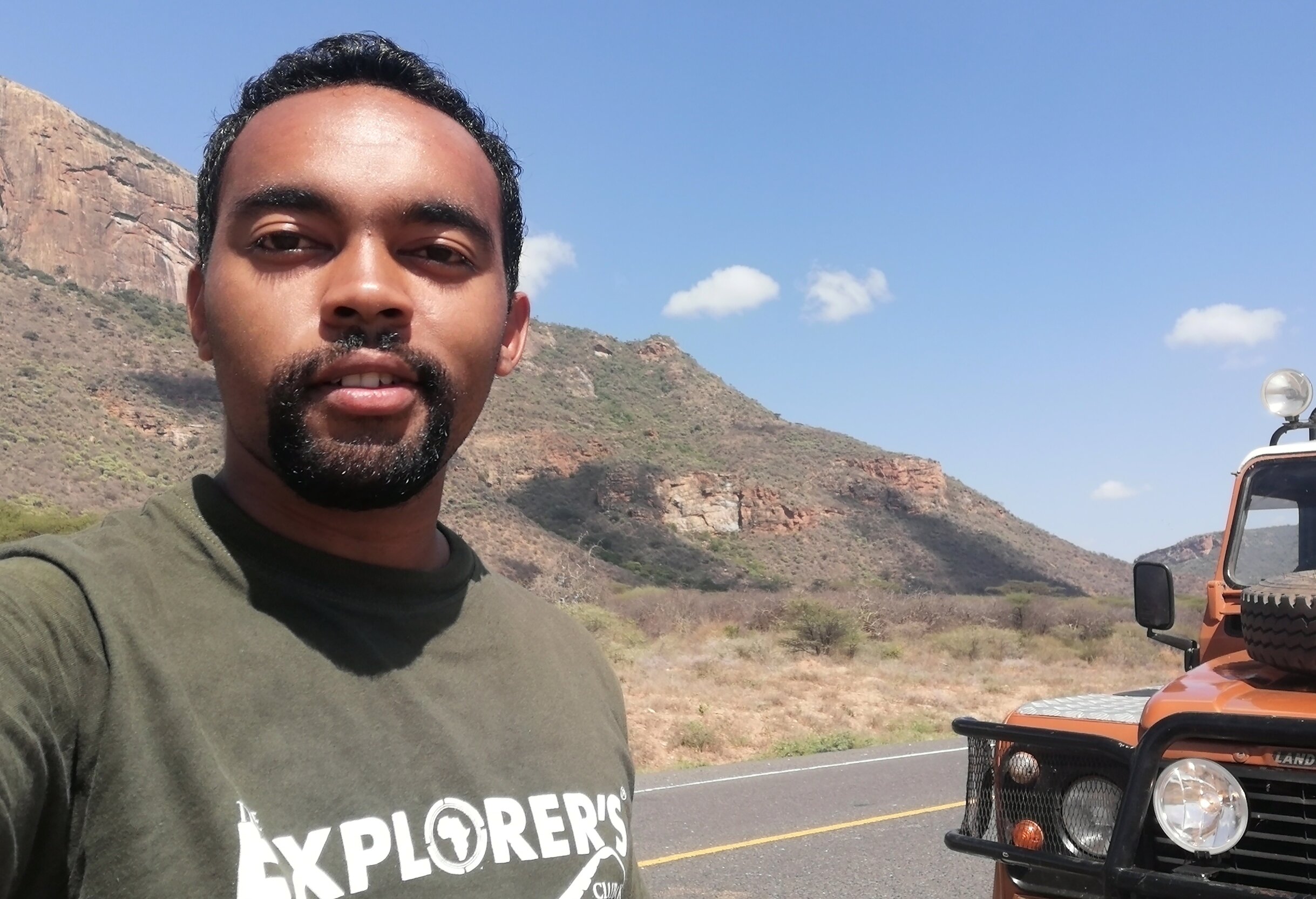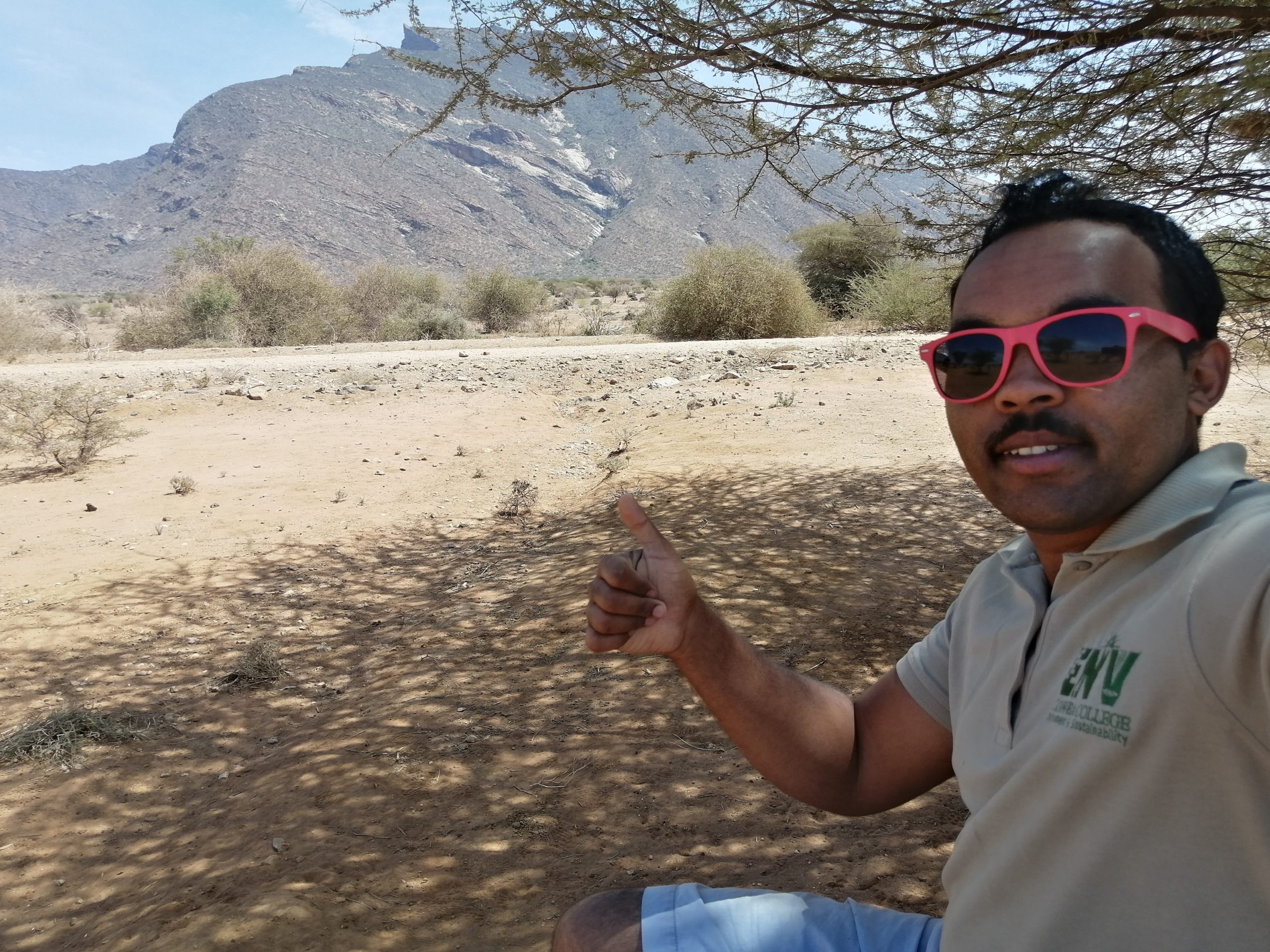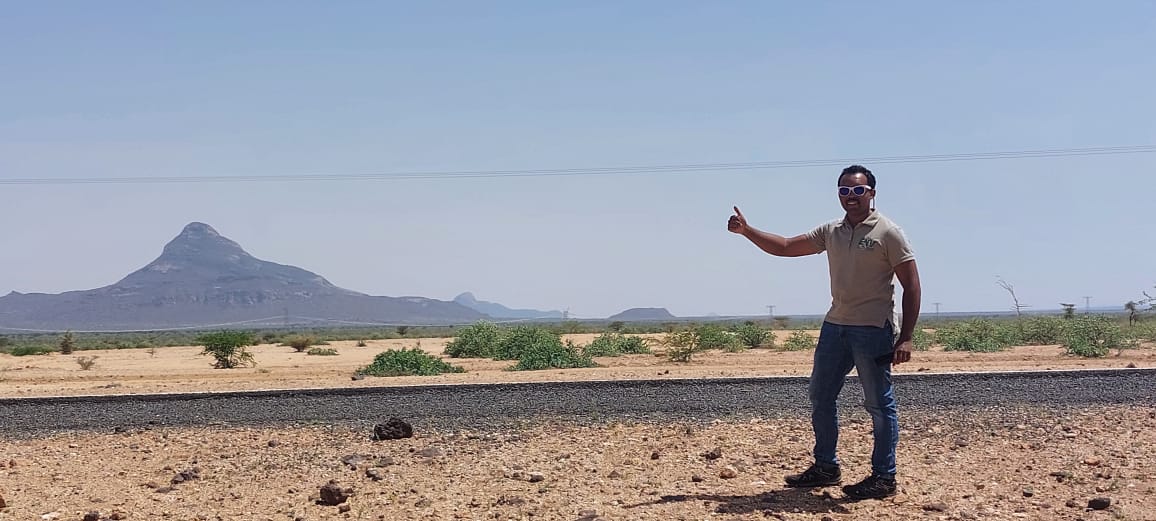
Alberto Borges talks about his journey from National Geographic explorer to Cambridge
When he was on his gap year Alberto Borges [2022] travelled to the north of Kenya to explore a remote area of the country which he knew little about. While there, he took a photograph which proved to be life-changing. It was of a camel spider-like creature with 10 legs and it turned out that it had never been seen before. That discovery led to a National Geographic explorer grant, university studies in environmental education in Kenya and the US and to the University of Cambridge. They are the first steps towards Alberto’s eventual goal of establishing a conservation centre in northern Kenya.
Mentors
While chance has played a key part in his life, Alberto has also benefited from some vital mentor figures. The main people who guided his career from an early age were his father, a Portuguese Indian who was born in Goa but moved to Kenya, and his mother, a Kenyan entrepreneur.
A former teacher, his father ensured that Alberto and his two younger siblings, Annamarie and Romey, went to good schools. That meant commuting 25 kilometres into Nairobi from the small town of Limuru on the capital’s outskirts. When he was ready for secondary school, Alberto had to sit an entrance exam for entry into the more academic secondary schools. His father knew the competition was fiercest in Nairobi so, before he was due to take the exams, he moved Alberto to a provincial boarding school in Murang’a. He later joined a secondary school in the Rift Valley. There, Alberto would go out on long walks in nature to escape the pressure of school, something that fed an interest in the environment, which the documentaries his father watched on tv had nurtured from an early age.
His parents noticed that Alberto was developing a keen interest in nature and knew that most Kenyan schools left little time in the curriculum for students to feed their extracurricular interests. So once again, they moved Alberto and his siblings to a private school which did the IGCSE, funded by a full scholarship. There Alberto’s classes ended at 3pm and he had the time to explore his interests. His parents’ decision paid off as Alberto was recognised with a certificate from the University of Cambridge for having the highest marks in his ESL exam.
Because of the extra hours, he had in his school day Alberto also started earning some money on the side of his studies. His parents , who ran an organic soap business, supplied cleaning products to Wilson airport and Alberto came along one day and met the owner of a balloon safari business which operated out of a hangar there. He had developed a fascination for old Land Rovers due to their use in conservation work. The hangar’s owner showed Alberto, then 15, the white Land Rover that he used to chase his hot-air balloons and bring tourists back home. He then handed over the keys to Alberto and offered to pay him to restore it. After restoring one Land Rover, Alberto worked on several others, developing his mechanical skills while being supervised by his father and earning money for the family.
Enterprise
Alberto’s father had become an organic soap entrepreneur almost by accident after a flood led to one of the bridges into the capital being covered with foam. Alberto’s father went to see what had happened and discovered the origins of the foam: people had been taking their cars to the river to be washed and were using chemical detergents. Normally the soap dried on the banks of the river, but due to the flooding, it had been swept downstream causing a foam to form. Alberto’s father wrote a report on this and sent it to the scientists investigating the incident.
He had also worked in schools in remote areas and had noticed that this kind of event didn’t occur among farming communities there. He realised that this was because they were using natural products rather than chemicals. So he developed an organic soap product and registered his company in 2010. It operates as a small cottage industry from home and works mainly with lodges in national parks who, by law, have to maintain a low carbon footprint. At the time Alberto didn’t realise that his parents’ company was what was paying for his education and upkeep, but the whole family now pitches in to keep it running – his brother has helped develop the company’s website, his sister runs the advertising and marketing, his mum leads the operations and Alberto is focused on environmental sustainability.
In 2013, Alberto’s father suffered a heart attack which compromised his ability to run the business and the family’s finances entered a challenging period. Alberto contributed his earnings to keep the family going. Alberto had finished secondary school and his parents wanted him to continue with his education. However, he wasn’t sure what direction to go in so his father advised him to take a gap year so that he could decide between engineering and geography.
Gap year
 In that year Alberto read about Marsabit, a little known, remote area in northern Kenya which early explorers had described. The town lies in a forested region known for its volcanoes and crater lakes which borders the Chalbi Desert. Alberto’s interest was ignited and he wanted to travel there.
In that year Alberto read about Marsabit, a little known, remote area in northern Kenya which early explorers had described. The town lies in a forested region known for its volcanoes and crater lakes which borders the Chalbi Desert. Alberto’s interest was ignited and he wanted to travel there.
His mother, who had worked in tourism, connected him with the area’s commissioner who agreed to take him there. Alberto arrived in the evening, when he was unable to see much and was shocked when he woke up in the morning. “In my reading it had described an isolated spot in the desert, but when I woke up I was in a place of forests and mountains,” he says. He explored the town and the different local culture, so different from urban life in Nairobi and he travelled with the district commissioner to a village on the shores of Lake Turkana, the largest desert lake in the world. Alberto’s father, who used to trade in gemstones, had told him that there was a place near Marsabit which was rich in agates. He could see rocks all around as he was driven by the lake. He stopped to take a photograph of a rock, but a creature suddenly darted out of the rock, surprising a barefoot man who was standing behind Alberto while he was taking the photo. It would prove to be a life-changing moment.
When he got home, Alberto showed the photographs of his trip to his father who lingered on the photo Alberto had accidentally taken. It depicted an unusual camel spider-like creature emerging from a stone. His father said he should check it out with scientific experts. They spent hours trying to match it with other spiders and couldn’t find anything similar. They told Alberto it could be a new discovery. “I returned home disappointed that I couldn’t tell my dad what it was. I told him they had said it could be a new discovery. That was the beginning of my journey to becoming a National Geographic explorer,” he says.
Alberto made several short trips to Marsabit and, with the help of the district commissioner and local people, tried to find the creature, but it proved very elusive. He even joined forces with the only camel spider expert in Africa, but they still couldn’t locate ‘Goldie’, as they had named the spider. The experience, however, solidified Alberto’s view of what he wanted to do next.
University
 After his gap year, he had enrolled at Kenyatta University in 2015 to study environmental education which meant that he could do field work in Marsabit and he applied successfully for a National Geographic grant. He was awarded $4,700 in 2016, becoming the youngest recipient at 18. In 2017, he was sponsored to attend a National Geographic explorers festival in Washington DC and was paired with Dr Luke Dollar who runs the National Geographic’s big cats initiative and conducts conservation research in Madagascar. Dr Dollar asked Alberto what his goals were and he replied that he wanted to set up a research centre in Northern Kenya, an idea he has since tweaked – he now wants to establish a conservation centre. Dr Dollar was enthusiastic and told Alberto he needed to focus on getting a good education as well as exposure to what it is like to run a research field station in a remote area. Promising to help Alberto through the first 10 years of his early career development, he invited him to visit his field station in Madagascar.
After his gap year, he had enrolled at Kenyatta University in 2015 to study environmental education which meant that he could do field work in Marsabit and he applied successfully for a National Geographic grant. He was awarded $4,700 in 2016, becoming the youngest recipient at 18. In 2017, he was sponsored to attend a National Geographic explorers festival in Washington DC and was paired with Dr Luke Dollar who runs the National Geographic’s big cats initiative and conducts conservation research in Madagascar. Dr Dollar asked Alberto what his goals were and he replied that he wanted to set up a research centre in Northern Kenya, an idea he has since tweaked – he now wants to establish a conservation centre. Dr Dollar was enthusiastic and told Alberto he needed to focus on getting a good education as well as exposure to what it is like to run a research field station in a remote area. Promising to help Alberto through the first 10 years of his early career development, he invited him to visit his field station in Madagascar.
When Alberto visited Dr Dollar in Madagascar to do field work he suggested that Alberto consider finishing his studies at his university, Catawba College in North Carolina. He argued that having Alberto in the class would motivate his US students since he was not only a National Geographic explorer but had also done a TED talk and that it would expose Alberto to new approaches to learning and different tools. Alberto won a full scholarship and in 2018 he moved to the US. During his time at Catawba, Alberto successfully applied to a local community organisation for grants for conservation work in Marsabit.
He continued his studies until he returned home in March 2020 just before Covid closed the borders. Alberto and he spoke about Alberto’s future and about the possibility of doing a master’s in conservation leadership. His parents wanted him to pursue postgraduate studies and saw Alberto as a beacon of hope for the family, which was suffering ongoing economic hardship. His father felt a master’s from the University of Cambridge would open doors and the two men discussed the university’s conservation leadership programme, with Alberto’s father helping to build his case for being accepted should he have to compete against a field of global scholars. “He was preparing me as he prepared my siblings in their respective fields,” says Alberto.
In October 2020 his father suffered another heart attack and passed away shortly afterwards. Alberto realised he had to step into his shoes, rebuild the business and helped his mother take care of his sister’s university fees. He had little time to mourn. He was given an extension from Catawba College to finish his studies and graduated summa cum laude, working part time alongside his studies so that he could send money home to the family. He says simply: “Failure was not a luxury I could afford.” Because of all of this he missed the deadline for applying to Cambridge in 2020, but did so in 2021 after spending more time in Marsabit doing research.
Cambridge
In early 2022, Alberto was invited for an interview for a Gates Cambridge Scholarship and planned to do the interview online. However, Dr Dollar said he would have a better chance if he was at Cambridge in person. He spoke to his colleagues at Catawba College and they pooled resources to raise the money to send Alberto to England for his interview. At the interview Alberto wore a coat which he had shared with his father. It didn’t match his suit, but it helped him nail the interview.
He has just begun his MPhil and has applied for grants to do fieldwork in Marsabit on human and elephant conflicts in the region. While he is there he will prepare the groundwork for establishing a conservation centre. He says of the MPhil: “I know the value of this programme and how it will prepare me for my next big idea.”












